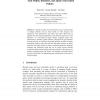Free Online Productivity Tools
i2Speak
i2Symbol
i2OCR
iTex2Img
iWeb2Print
iWeb2Shot
i2Type
iPdf2Split
iPdf2Merge
i2Bopomofo
i2Arabic
i2Style
i2Image
i2PDF
iLatex2Rtf
Sci2ools
127
click to vote
PRICAI
2000
Springer
2000
Springer
Task Models, Intentions, and Agent Conversation Policies
It is possible to define conversation policies, such as communication or dialogue protocols, that are based strictly on what messages and, respectively, what performatives may follow each other. While such an approach has many practical applications, such protocols support only "local coherence" in a conversation. Lengthy message exchanges require some infrastructure to lend them "global coherence." Recognition of agent intentions about the joint task is essential for this global coherence, but there are further mechanisms needed to ensure that both local and global coherence are jointly maintained. This paper presents a general yet practical approach to designing, managing, and engineering agents that can do simple run-time intention recognition without creating complex multi-state protocols. In this approach we developing abstract task models and designing conversation policies in terms of such models. An implemented agent assistant based on these ideas is briefly...
Artificial Intelligence | Conversation Policies | Global Coherence | Local Coherence | PRICAI 2000 |
Related Content
| Added | 25 Aug 2010 |
| Updated | 25 Aug 2010 |
| Type | Conference |
| Year | 2000 |
| Where | PRICAI |
| Authors | Renee Elio, Afsaneh Haddadi, Ajit Singh |
Comments (0)

